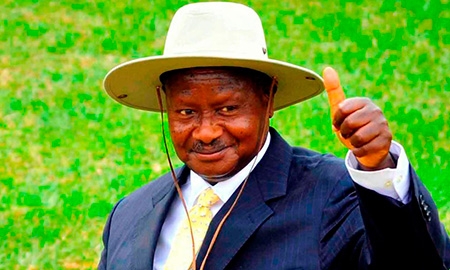One of Africa’s main intergovernmental organizations, the East African Community – made up of the United Republic of Tanzania and the Republics of Uganda, Rwanda, Kenya, and Burundi – encourages cooperation among member nations in economics, trade, infrastructure, travel, and politics. The East African region is one of the continent’s fastest growing regions and has ample room for even greater growth and foreign investment. The EAC’s goal to pursue this growth.
One of the three original members of an association leading to the EAC’s formation, Uganda is positioned to become a regional leader thanks to its drive to succeed, its cooperation with other nations and its experience in international relations, which includes working with the United States and other nations in the global war against terrorism.
Uganda, the third-largest economy in the EAC (Kenya and Tanzania occupy the first and second places), is expected to grow more in the coming years due to its undeveloped potential in agriculture, oil, mining and hospitality and tourism. With the right amount of investment and work, Uganda, and therefore its people, could experience a great period of growth and economic stability.
The agriculture industry generates 68% of Uganda’s labor force and 46% of its export earnings. While 80% of the nation’s land is arable, currently only 35% of it is cultivated. Most of the cultivation is subsistence farming, but there is good output growth potential in both coffee and corn. In fact, support from the government has helped Uganda become an East African leader in coffee exports. The government is particularly interested in encouraging growth in the areas of fruit and vegetable processing, such as producing and canning juice concentrate and frozen pulp from tropical fruits. Investors can also help strengthen the nation’s agricultural subsections, such as the processing and preparation of crops like tea, coffee, tobacco, and cotton.
| Uganda, the third-largest economy in the EAC, is expected to grow more in the coming years due to its undeveloped potential in agriculture, oil, mining and hospitality and tourism. |
The potential exists for greater agricultural exports if the industry’s challenges can be overcome; these include a lack of technology and cold storage facilities, insufficient extension services, crop pests and diseases, and infrastructure inadequate for the country’s current needs and therefore insufficient for any growth that will take place.
The oil industry is poised to improve Uganda’s economy as well. While exploration efforts had been hampered for years due to regional and civil conflicts, the pace of exploration is now quickening due to the region’s increased stability and peacekeeping efforts by Uganda’s President, Yoweri Kaguta Museveni. The country’s oil export earnings are expected to nearly double when commercial crude oil production begins by 2016. In fact, oil revenues are expected to replace and even surpass the nation’s donor contributions.
The national government aids this development. For example, the energy budget for the fiscal year 2012-2013 was tripled so that several vital projects related to the oil industry could be started, including oil refinery construction, hydroelectric power projects, and an oil distribution network. Still, challenges exist, like the lack of an export oil pipeline, so full-scale oil production must wait for this infrastructure.
The oil industry’s forecasted growth will benefit Uganda’s hospitality and tourism industry in business-related travel, and travel for pleasure will increase when business visitors combine work with leisure. Uganda welcomes 600,000 visitors every year, many to its 10 national parks and 12 wildlife reserves. In 2011 the industry’s revenues were $805 million, the second-largest source of foreign revenue, after coffee exports. Insufficient infrastructure is the industry’s greatest challenge: traffic growth exceeds road growth and existing roads are inadequately maintained.
As these industries grow, telecommunications needs will also increase. Uganda’s mobile penetration rate was less than 50% in June 2013. Increasing the range and quality of coverage in rural areas (where the majority of the population lives) is necessary, but offering high-value services, such as 4G LTE, in urban areas is more profitable.
To meet banking needs, the number of financial institution branches has almost doubled in just the past three years, and new projects include mobile and internet services to make banking more accessible and convenient. Uganda was mostly protected from the global credit crisis, and as a result its financial institutions are in relatively good shape. In fact, the Bank of Uganda, one of the country’s 24 banks, is one of the sub-Saharan Africa’s most respected central banks.
With Uganda’s will to improve its economy, its hard-earned stability and its great potential, the country is well-positioned to be a regional leader.

0 COMMENTS